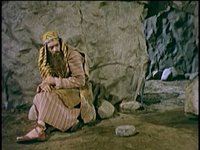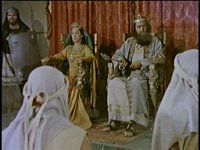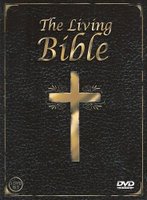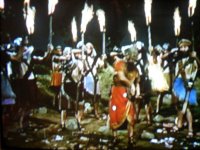Joshua the Conqueror (1958)
 Until recently there had been precious few films about Joshua, though for some reason when I wrote a previous post on the subject I forgot about this entry from the Living Bible Old Testament series. As I was researching for something else I'm writing at the moment I thought it was probably time I posted a few comments on it.
Until recently there had been precious few films about Joshua, though for some reason when I wrote a previous post on the subject I forgot about this entry from the Living Bible Old Testament series. As I was researching for something else I'm writing at the moment I thought it was probably time I posted a few comments on it.As always the series plays things pretty straight. In this case however that makes this little film more distinctive as it's the only film which portrays any other incident from the Book of Joshua aside from the victory over Jericho.
As you would expect the victory over Jericho is the film's high point, but it also manages to squeeze in other episodes such as the miraculous crossing of the River Jordan and Achan's sin and the resulting defeat to the army of Ai.
These films are always low budget, and I generally avoid criticising a film for that alone, however here the "miraclous" crossing of the Jordan scene really does lack any imagination. One minute we're shown a swelling, fast-flowing river, then there's a cut to Joshua, a description of the miracle and then just a close up of some feet running over some rocks. I accept that the film would not be able to match DeMille level special effects, but if you read DeMille's autobiography there's a bit in it where he discusses how in order to make the effect look right in his 1923 The Ten Commandments the entire cast and crew spent a frentic few minutes gathering bits of seaweed to scatter on the ground to make it look realistic before the angle of the sun change too much. Three's no such attention to detail here such that low budget and low creativity really make the moment laughable.
In contrast when the walls of Jericho come tumbling down there's at least some judicious cuts and thought that has gone into the process in order to make the equally low budget miracle at least look credible. It's still a little hard not to smile to oneself, but with so few versions of certain stories, where would we be without the Living Bible.
One thing that is noticeable about the fall of Jericho is that, aside from Rahab (dressed in red) and her family, we never see another of the people of Jericho. The film narrates their slaughter, but keeps them off screen. This has the effect of hiding the faces of the victims, silencing their voices and making their destruction less troubling. To it's credit the film isn't at pains to demonise them, but it does marginalise their voice and prevent viewers from empathising with them.
Finally, as I've already mentioned, this is the only film I know of which covers the incident where Achan steals some of the "devoted things" (7:1), angering God so much that he causes Israel to be defeated and then orders the Israelites stone/burn him to death. It's not hard to see why this incident might be excluded even for a team of filmmakers intent on trying adapting the Book of Joshua. Visualising it, however, only makes it seem all the harsher than reading it. I suppose though that this is the flip side of the criticism I levelled at the film not showing any dying Jericonians. Portraying Achan's brutal treatment does raise questions as to either the goodness of God's character, or the interpretation of how the vent has been recorded.
Anyway here's a scene guide for the film. All references are from the book of Joshua:
God’s Commission to Joshua (1:1-9)Incidentally, I opened this by saying "until recently". The last few years have seen Joshua gaining higher profile than almost ever before, firstly with his escapades being covered in the History Channel's series The Bible and then with the character featuring in Exodus Gods and Kings.
Spies sent to Jericho meet Rahab (2:1-24)
Miraculous crossing of the Jordan (3:1-17; 4:10-18)
12 Stones set up at Gilgal (4:1-9,19-24)
Joshua’s Vision (5:13-15)
Processions around Jericho (6:1-14)
Fall of Jericho (6:15-25)
Achan’s Sin (7:1,21)
Defeat at Ai (7:2-5)
Achan’s death (7:6-26)
Joshua renews the covenant (8:30-35)
Joshua’s farewell speech (23:1-24:28)
Labels: Joshua, Living Bible, Living Bible Old Testament































